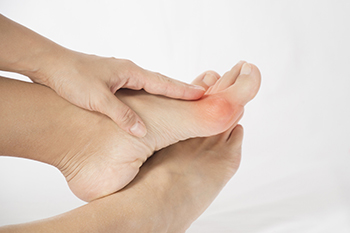

Bunions may be prevented from developing. A bunion is defined as a bony protrusion on the side of the big toe and can gradually occur from wearing shoes that do not fit correctly. In severe cases, the bunion can cause the other toes to overlap, and this may cause difficulty in walking and completing daily activities. Some of the suggested ways to prevent bunions from developing can include wearing shoes that have adequate room for the toes to move freely as well as avoiding high heels. It can be beneficial to frequently rest the feet as this can provide the opportunity to stretch the toes. If the bunion is painful, it may feel better to wear a protective pad on top of it which may aid in reducing the pressure against the shoe. When a bunion is severe, surgery may be a necessary option for permanent relief. If you notice the beginning stages of a developing bunion, it is suggested that you contact a podiatrist who can offer the correct treatment options.
If you are suffering from bunions, contact Dr. Harris L. Klear of Burlington County Podiatry Associates. Our doctor can provide the care you need to keep you pain-free and on your feet.
What Is a Bunion?
A bunion is formed of swollen tissue or an enlargement of boney growth, usually located at the base joint of the toe that connects to the foot. The swelling occurs due to the bones in the big toe shifting inward, which impacts the other toes of the foot. This causes the area around the base of the big toe to become inflamed and painful.
Why Do Bunions Form?
Genetics – Susceptibility to bunions are often hereditary
Stress on the feet – Poorly fitted and uncomfortable footwear that places stress on feet, such as heels, can worsen existing bunions
How Are Bunions Diagnosed?
Doctors often perform two tests – blood tests and x-rays – when trying to diagnose bunions, especially in the early stages of development. Blood tests help determine if the foot pain is being caused by something else, such as arthritis, while x-rays provide a clear picture of your bone structure to your doctor.
How Are Bunions Treated?
If you have any questions, please feel free to contact one of our offices located in Marlton and Delran, NJ . We offer the newest diagnostic and treatment technologies for all your foot care needs.